Commitment to knowledge and community
Action Plan 2025-2030
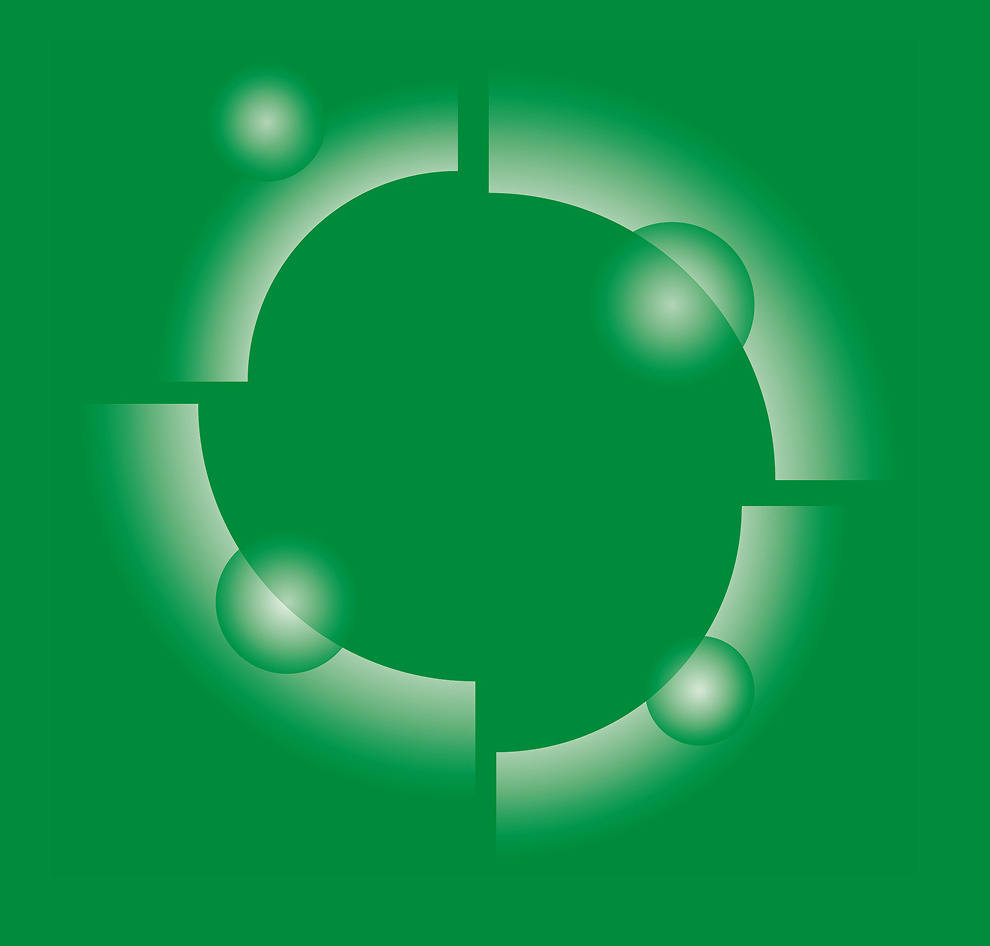
Action Plan 2025-2030
1. Introduction
We present the 2025–2030 Action Plan of the Universitat Autònoma de Barcelona Library Service, with the slogan: Commitment to knowledge and community.
Aligned with the UAB Horizon 2030 plan, this plan forms part of the university’s Strategic Plan to improve the impact and visibility of research and knowledge transfer at the 2024-2027. The action plan is structured around the axes of teaching, research, people, campus, governance and acknowledgement and sets out the strategic lines that we intend to follow in the coming years, consolidating the commitment of the libraries towards the university community, open knowledge, innovation, inclusion and sustainability. These actions contribute to the development of the principles set out in the 2030 Agenda and reflect the specific Sustainable Development Goals that we work on each axis.
In line with our values, libraries understand transformation as an inherent process and an opportunity for growth. This applies to digitisation, technology, physical spaces, collections and services, with the aim of increasing our impact on strategic areas of the university and contributing to its success. The achievements of the plan will be measured both quantitatively and qualitatively, using data and narrative to reflect its real impact.
The content of the plan is the result of the joint efforts of the entire Library Service team and the contributions of the university community. To move it forward, we need to collaborate with the entire university, weave alliances with its constituent entities, and encourage active participation from the local area.
The actions resulting from the development of this plan will establish UAB libraries as a leading example of commitment to knowledge and the community.
Rosa Maria Sebastián Pérez
Vice-Rector for Innovation, Transfer and Entrepreneurship
Núria Casaldàliga Rojas
Director of the Library Service
Approved by the General Committee of Users of the Library Service on 17 March 2025.
2. Mission, vision and values
Mission
UAB libraries encourage the creation, dissemination, preservation and transfer of knowledge, so that it is open and accessible.
With our experience, we contribute to the success of the university and promote inclusion and sustainability.
Vision
UAB libraries are acknowledged for our capacity for innovation, our commitment to open science, our role as facilitators of change in the university, and our position as a reference in the professional environment.
Values
We focus our activities and services on user’s needs.
- We integrate the principles of diversity, equality and inclusion in all our actions.
We are committed to sustainability.
We act ethically, respectfully and with institutional responsibility.
We are open-minded, forward-looking and embrace innovation.
We encourage cooperation aimed to join forces and achieve shared goals.
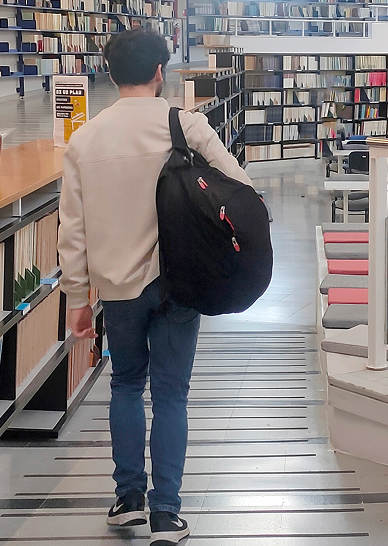
3. Strategic axes and objectives
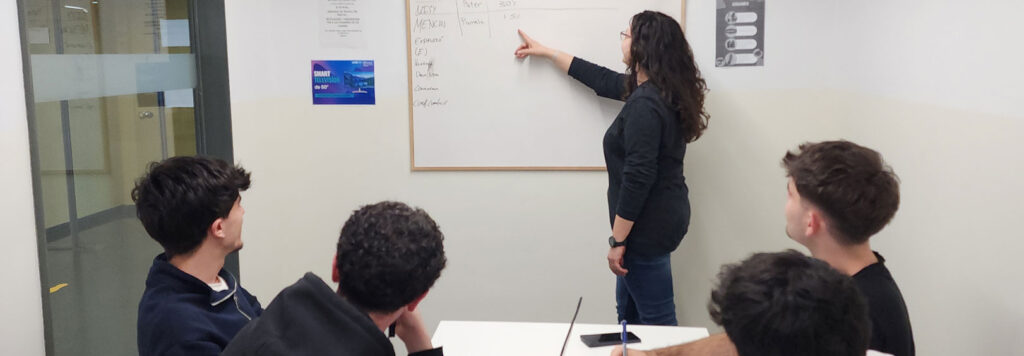
Teaching
In the current educational context, libraries are an ally for learning and innovation at the university, as well as a meeting point where knowledge can be generated and community created.
Building alliances with teaching staff is essential, and it is necessary to create synergies that enrich students’ education and help them develop critical skills. This collaboration between library and teaching staff leads to the organisation and hosting of joint activities and projects that benefit students and add value to the educational community. In this framework, libraries become dynamic environments that are integrated into the overall learning experience of students.
In addition, the constant evolution of disciplines and the proliferation of information require tools that help identify appropriate sources, verify data, and encourage critical thinking, with the aim of contributing to a responsible and ethical research culture.
"Libraries become dynamic environments that are integrated into the overall learning experience of students."
Creating personalised training pathways
The learning process is individual and personalised, and it is designed based on a new training strategy so that users can choose between different academic itineraries, either face-to-face or virtual, to improve their experience and help them acquire digital skills and competences.
The university provides this training with innovative methodologies and the libraries contribute with a wide and permanently updated training offer, which improves the students’ ability to analyse and evaluate information.
Strengthening relationships with students
Linking the library to students contributes to a better learning environment. At the same time, involving the students as an active partner and generator of ideas is an opportunity when designing services and spaces or selecting resources.
It is necessary to ensure that the library is visible in the most effective channels, events and environments in order to encourage its active involvement.
Promoting the creation and use of open educational resources
In order to provide accessible and equitable education, one of the challenges that libraries must face is contributing to the development of open educational resources (OER), encouraging their use, and disseminating and raising awareness of existing OER platforms.
We will participate in initiatives that are carried out from different areas of the university to promote and support the development and use of open educational content.
Visibilise and expand services available to teaching staff
Libraries strieve to understand the needs of teaching staff and to define, in cooperation with other areas of the university, a more comprehensive model of support for teaching.
In addition, it is necessary to be aware of emerging learning methodologies, such as challenge-based learning or service learning, in order to respond to them appropriately.
Impact on the Sustainable Development Goals

Keywords
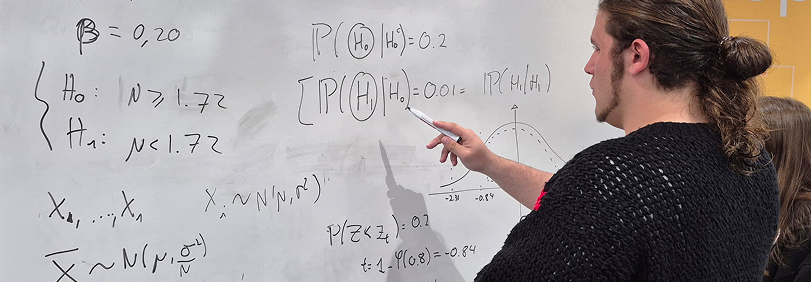
Research
Libraries support the research carried out at the UAB, advising research staff and other areas and services of the university.
In recent years, following the paradigm shift to open science, libraries have intensified their support to meet the changing needs of research staff in publishing and disseminating scientific output in open access.
It is essential to strengthen partnerships and work in collaboration with all areas of the university involved in research, in order to ensure the best service for the university community.
"Libraries have intensified their support to meet the changing needs of research staff."
Fostering the deployment of the UAB Open Science strategy
Within the framework of current legislation, the UAB has approved its strategy and commitments to open science that will be deployed in the coming years. By participating in the Open Science Advisory Committee, the libraries will contribute with all their experience to lead and promote the necessary actions to make open science a standard practice at the UAB.
Expanding support for research data management
Research funding agencies and open science legislation require research staff to publish research data under open access terms and to develop a Data management plan.
Some of the actions we will carry out include assisting research staff in data management, acquiring experience in this field, resolving any doubts that may arise, and implementing improvements in the management process.
Developing the management and consultation functionalities of the UAB Digital Document Repository (DDD)
The DDD is the repository in charge of the preservation and open dissemination of the UAB’s scientific publications, as well as the management of the special collections of its libraries.
It needs to be strengthened as a primary infrastructure for open science with software that favours document management and guarantees the security and preservation of its content. At the same time, a user-friendly web environment must be developed to improve consultation, accessibility and interoperability.
We will promote the DDD as a trusted repository by monitoring and reviewing the Preservation Policy of the UAB digital document repository to facilitate and guarantee access to digital content in the medium and long term.
Meeting these challenges will promote the role of DDD as a tool for transferring knowledge to citizens.
Facing the new challenges of research evaluation
The signing of CoARA by the UAB and the new requirements of the AQU and ANECA agencies for the accreditation and evaluation of research have changed the way research is evaluated. Libraries are acting proactively by advising on the new criteria, developing and sharing support tools for users, and working with other university stakeholders to promote this change.
We will participate in CoARA working groups, inside and outside the UAB, and we will collaborate in the development of new evaluation criteria at the university.
Impact on the Sustainable Development Goals

Keywords
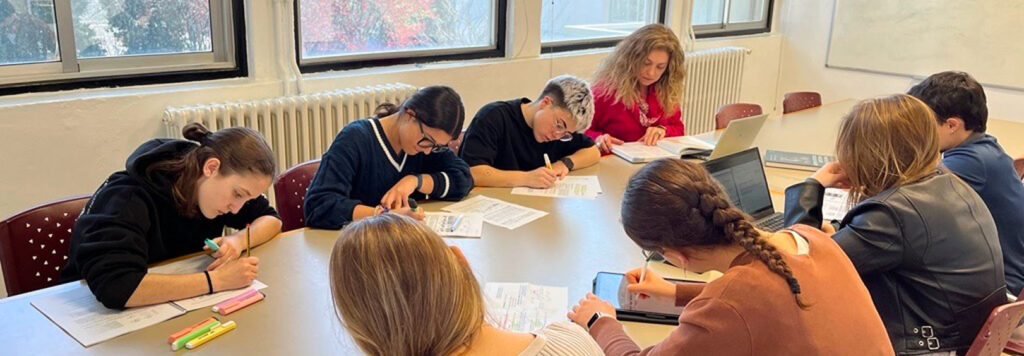
People
People are the driving force of institutions, and it is necessary to have a well-trained team that contributes to increasing the competitiveness of the university in a globalised environment.
Some of the trends are related to hybrid work, lifelong learning, digitalisation of tasks, respect for diversity and inclusion, and emotional wellbeing. These actions entail changes that must be perceived as improvements in personal and professional development.
To deal with the generational handover that is unfolding it is mandatory to identify new leaders as well as broadening collective knowledge. It is essential to work in alignment with the university and to foster a sense of belonging, leading to consolidate a committed team that is adaptable to change, while at the same time guaranteeing the individual satisfaction of the people who make up the team.
"People are the driving force of institutions. It is essential to have a well-trained, committed and adaptable team."
Enhancing the internationalisation and participation of team members in the inter-university environment
To strengthen the professional skills of the team, increase their experience and develop the skills of the people working at the Library Service, we will encourage participation in working groups of CSUC, REBIUN, LIBER, ECIU and other professional networks, and we will increase involvement in the Erasmus programme.
Other lines of action will be to encourage participation in conferences and congresses and creating a supportive environment for connections with the aim to share good practices with other institutions.
Strengthening staff development and knowledge exchange
Fostering the team’s professional development increases their motivation and job satisfaction, eases adaptation to the environment and creates a sense of belonging to the group. For this reason, it is necessary to stimulate skills, to strengthen cohesion and retain or attract talent inside and outside the university.
Dynamic and flexible teams adapt better to eveevolving environments. It is therefore important to explore new ways to encourage the mobility of people within the different units of the Library Service.
Transforming the team to meet future challenges
The UAB libraries are constantly striving to have an organisational structure prepared to evolve in accordance with the demands of the environment and to anticipate the future needs of the UAB.
The widening of professional profiles, the internal distribution of tasks, roles and skills, as well as the appropriate professional acknowledgement of the people who form part of the team, are key and exciting elements to advance.
Promoting a healthy and suitable working environment
A healthy working environment improves job satisfaction and fosters inspiration, therefore, we will reinforce actions that generate comfort, confidence and wellbeing and that help to prevent stress.
Impact on the Sustainable Development Goals



Keywords
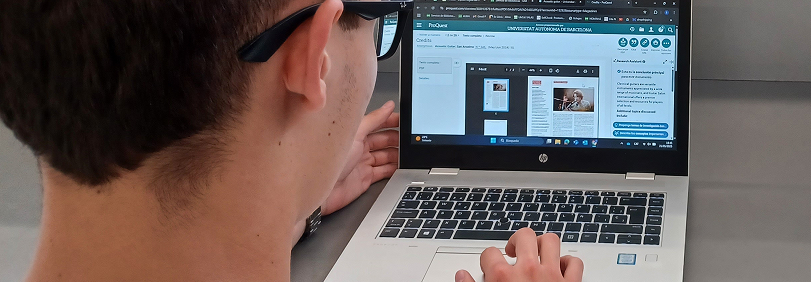
Campus
The multipurpose and flexible spaces in the libraries encourage exchange, collaboration, learning and transmission of ideas among the university community. The UAB campus experience is also nourished by the territorial presence and proximity offered by the libraries, that become a knowledge hub.
Part of this knowledge is generated from the information resources we make available to users. In accordance with the current social environment, it is necessary to take a step further to analyse the collection and introduce a new look from different perspectives, such as accessibility, diversity and inclusion. We want to emphasise those special collections that make us unique and to carry out the necessary actions to preserve and disseminate them and expand the university’s heritage legacy.
"The multi-purpose spaces and collections encourage learning and the transmission of ideas among the university community.”
Diversifying library spaces to enrich the user experience
Diversification of spaces is essential to adapt to new forms of learning, which are increasingly collaborative and interactive. Using spaces collectively strengthens community ties and creates a more cohesive and active environment.
Providing attractive spaces, with flexible furniture and technological equipment, increases people’s wellbeing, stimulates creativity and makes it easier for us to respond to the emerging needs of the immediate environment
Developing collections and applying sustainability criteria
The means of sharing resources with university libraries around the world have been optimised through solutions that facilitate individual autonomy and allow faster access to non-subscribed content. This opens the possibility of approaching collection development from a more global point of view.
In addition, to have a more sustainable stock of books and journals, we will apply strategies that reduce our environmental impact, such as to analyse in depth the usage for decision making and to consider the added value of suppliers in our immediate environment.
We need to have more efficient systems to track recommended bibliographic resources and to offer a balanced collection in all areas of knowledge, appropriate to learning, teaching and research needs.
Ensuring diversity, equity and accessibility of documentary resources
We commit to promoting collections that reflect a wide range of perspectives and experiences in an inclusive and respectful academic environment. By incorporating materials representative of a diversity of cultures, identities and viewpoints, libraries contribute to an academic environment that appreciates diversity and inclusion, creating a more cohesive and empathetic community.
This diversity of resources also prepares students for a globalised world, where the ability to work and communicate with people from different backgrounds and identities is essential.
Promoting heritage collections and digital humanities
The digitisation of heritage collections and personal collections places us in a good position to deepen digital humanities projects. It is necessary to focus on capturing, sharing and increasing the contents of these collections in order to increase their social impact and make them available to be used in different fields.
Digital humanities are a tool for transferring knowledge to society. They also help to create alliances with university teaching and research staff and foster interdisciplinary relations between different fields of knowledge. Libraries want to play a role in this network and participate by contributing content and encouraging the implementation of new technologies.
Impact on the Sustainable Development Goals



Keywords
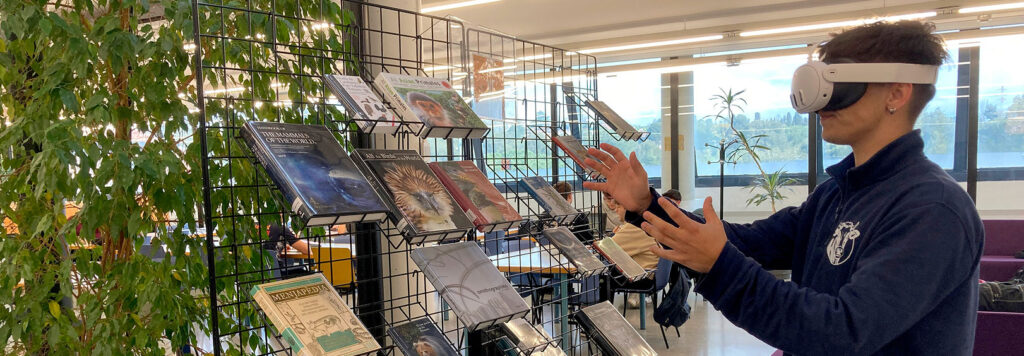
Governance
Factors such as technology, professional training and collaboration are deeply rooted in the Library Service and are the basis for facing the digital evolution in which we are immersed.
The governance model we want is based on quality and sustainability, making the UAB libraries an efficient, responsible and transparent service at all levels that is able to build trust within the university community.
There is a need to drive digital transformation and improve processes using technologies that increase communication and access to information.
Unlocking the potential of emerging technologies and applying them to processes and services requires being able to anticipate and assess both the technical and socio-occupational impact, and to seize the opportunities for transformation that technology offers us.
"The governance model we want is based on quality and sustainability, making the UAB libraries an efficient, responsible and transparent service at all levels."
Promoting innovation and the proactive application of emerging technologies
There is a need to analyse and evaluate emerging technologies and to be aware of both their virtues and their limits. Efforts must be made to maximise the interoperability of the applications we use or make them available to the university community.
The use of artificial intelligence in service delivery, customer service and streamlining internal processes is an evolving reality that needs to be explored.
Developing analytical capacity and professional skills related to the use of technologies is the seed for discovery, creativity and providing a better service to the university community.
Fostering digital transformation to improve processes and services
Digital transformation involves integrating and adapting technology to one’s own specific needs, being proactive to gain efficiency and acting with professional responsibility.
The use of technology in the digitisation of processes and services is a source of opportunities for improvement that allow us to be well positioned to face future challenges.
Increasing tailor-made services for groups within the university community
The analysis of the singularities of the different groups that are part of the UAB will allow us to strengthen and expand the provision of tailomade services. To carry out this analysis, we will develop strategies for participation, co-creation and open and continuous communication.
In accordance with the results obtained, we will promote actions aimed at the personalisation of services, with the objective of improving users’ experience by responding more effectively to their needs, preferences and expectations.
Impact on the Sustainable Development Goals


Keywords
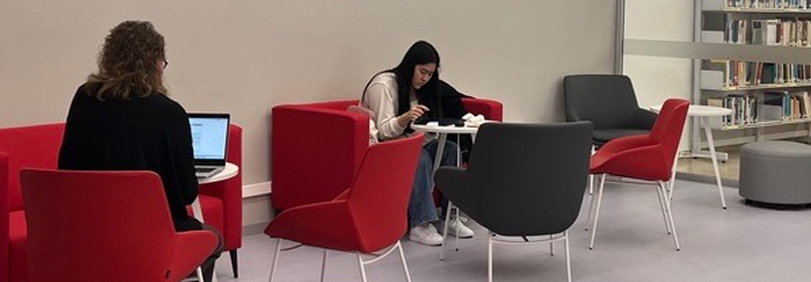
Acknowledgement
The UAB campus is a distinguishing feature of the university and is an element of attraction for students that allows the development of multiple activities beyond strictly academic life. The UAB libraries want to contribute to create an environment that favours the global growth of people, with different activities and events.
In order to consolidate the role of libraries as key agents in the dynamisation of the university, we will encourage the active participation of all members of the university community by establishing strategic alliances that have a visible impact on society.
"We are a loudspeaker to increase the societal impact of the university's teaching and research."
Being a dynamic agent of the university community
The libraries become meeting and exchange places, where creativity, emerging talent and culture are promoted in a dynamic environment, while offering a quality service to all campus centres, with extended opening hours and flexible physical spaces.
The convergence of these factors brings us closer to teaching and research staff, students, administrative and service staff, and everyone engaging with the university. The Library Service is a dynamic agent of the institution, with the capacity to promote dialogue between different actors in a suitable environment.
Increasing university’s impact on society
In an interconnected world, libraries act as a nexus between the university community and society at large. We play a visible role to increase the societal impact of university teaching and research, and we are centres of knowledge, innovation and community development.
Strengthening collaboration and creating new alliances to foster innovation
We work with transversal and interdisciplinary teams that promote new ideas and stimulate experimentation.
We encourage collaboration with different areas of the UAB to achieve better results, while focusing on service.
We invest efforts to build links and cooperate with national and international organisations with the aim to promote personal growth and wellbeing.
Impact on the Sustainable Development Goals


Keywords
4. Development, monitoring and evaluation
The preparation of this Library Service action plan has involved members of the entire university community, to whom we thank for their collaboration and contributions. The calendar and main activities carried out are set out below.
Monitoring and evaluation
The Library Service monitors and analyses the evolution of its activity based on the indicators established in the quality management system, which can be consulted on the website.
The strategic objectives of the plan will be translated annually into operational objectives which will be evaluated through these indicators, monitored on a six-monthly basis.
A progress report will be prepared and disseminated yearly.
At the end of the Action Plan, a report on the achievements will be drawn up.
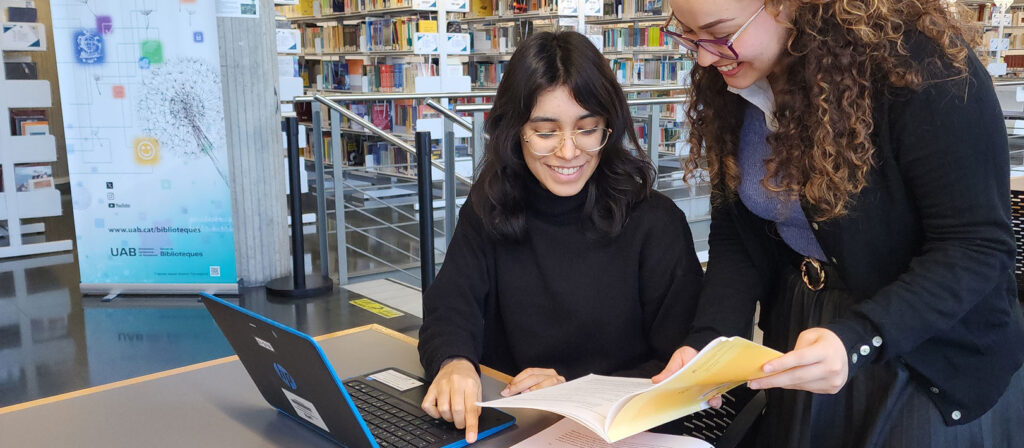
N Building. Plaça Cívica. UAB Campus. 08193 Bellaterra (Cerdanyola del Vallès)
+34 93 581 1015
The UAB is a young, public and groundbreaking university. A leader in international rankings and a benchmark in research. Barcelonian, Catalan and international. A transformative, supportive, diverse and egalitarian, sustainable and healthy, participative and cultural university. And a campus university, with its faculties and schools, research institutes and services all within a natural environment that offers a variety of unique experiences.
© 2025 Universitat Autònoma de Barcelona
